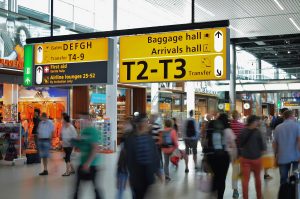
Am I entitled to accommodation or meals in the event of a delayed or cancelled flight?
In the vastness of the Canadian sky, the unexpected can happen at any time: a delayed or cancelled flight. This mishap, far from uncommon, raises a crucial question for travelers: “Am I entitled to accommodation or meals in the event of a delayed or cancelled flight?” The answer is not just a formality; It reflects a regulatory framework designed to protect passengers. The rights of air travellers in Canada are governed by provisions that aim to alleviate the discomfort caused by these inconveniences.
Air transport is subject to a multitude of variables… meteorological, technical, human; all these factors can upset the planned course of a trip. When you find yourself stuck in an airport, looking at the departures board and seeing the dreaded “delayed” or “cancelled” label, a cascade of questions comes flooding in. What are your rights? What steps should be taken to benefit from adequate care?
Let’s go;
Situation | Obligation of the company | Planned benefits | Conditions / Important Notes |
Delay ≥ 2 hours (attributable to the company) | Immediate assistance | Refreshments + means of communication | Applicable only if the cause is under the control of the company (excluding weather, force majeure). |
Delay ≥ 3 hours (attributable to the company) | Accommodation if needed + transport | Hotel or similar accommodation + return shuttle | Mandatory if waiting until the next day; Applicable for large and small companies. |
Cancellation with waiting until the next day (attributable to the company) | Accommodation + meals + transport | Hotel, meals at each waiting period, hotel-airport transport | Mandatory even if rerouting is planned. |
Delay or cancellation due to force majeure (weather, medical emergency) | Repayment or redirection only | No obligation to provide care or assistance Only obligation to inform | No monetary compensation. |
Procedure for obtaining accommodation/meals | Contact Company Counter | Meal vouchers, hotel vouchers, transport organisation | Ask staff immediately; Keep tickets and proofs. |
Recourse if refusal | Canadian Transportation Agency (CTA) | May result in a binding decision | Possible after refusal or lack of response from the company. |
Your rights under Canadian law
The first thing to know is that Canadian legislation (including the Air Passenger Protection Regulations) clearly stipulates the obligations of airlines to their customers when these events occur. If your flight is cancelled or has a significant delay, be aware that carriers must contact you and explain your rights in writing.
These rights vary depending on the length of the delay and the circumstances of the cancellation. For example, if the delay exceeds two hours, the company must offer you refreshments and a means of communication; If the delay reaches three hours or more, that’s where accommodation options come into play. It should be noted, however, that these obligations have certain limitations: they do not always apply in situations beyond the control of the company (such as extreme weather conditions).
Conditions for receiving coverage
To be eligible for compensation in the form of accommodation or meals, several criteria must be met. The detail matters: it is not enough for a flight to simply be delayed. The cause of the delay plays a crucial role (mechanical breakdown attributable to the company versus force majeure), as does the duration of the setback.
In addition, there are often procedures to follow to claim what is owed to you. Do not hesitate to ask for information directly from the ground staff; They are there to assist you. Keep all receipts and supporting documents (boarding tickets, official communications) as they will be necessary if you need to assert your rights later.
How to proceed in practice?
When your flight is significantly delayed or cancelled, head to the relevant airline’s counter without delay. Clearly express your situation and ask what options are available for your specific case… An agent should then inform you of your rights and the steps to take.
If you are offered accommodation, make sure you understand where the hotel is located and how to get there (is there a shuttle available?). As for meals, you may be given vouchers valid in certain restaurants or points of sale within the airport; Check their validity and the associated conditions.
In case of refusal or dissatisfaction
It happens that despite your legitimate requests, the answer obtained is not satisfactory. In this case, it is advisable to escalate the situation: ask to speak to a supervisor or contact customer service afterwards. Always keep a written record of exchanges and maintain a courteous but firm attitude.
If your attempts are unsuccessful, the Canadian Transportation Agency (CTA) may play a role in your dispute with the airline. You can submit a formal complaint to this body, which will then review your case and make a decision that is binding on both parties.
Additional precautions
Finally, it can be a good idea to take certain precautions before a problem even occurs. Purchasing comprehensive travel insurance can provide significant peace of mind; It may cover additional costs incurred by an unexpected delay or cancellation.
Also, familiarize yourself with each airline’s specific policy before you leave: they can vary significantly. And above all… Be proactive! Monitor the status of your flight via the internet or mobile apps so that you are informed quickly in the event of any unexpected changes.
Travelling sometimes involves its share of unforeseen events… But knowing your rights is already a first step towards an effective resolution to air disruptions. Keep this information under wraps; It could transform your experience during the next turbulent cloud encountered on your celestial journey.


